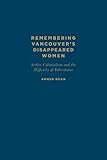Remembering Vancouver's Disappeared Women : Settler Colonialism and the Difficulty of Inheritance / Amber Dean.
Material type: TextPublisher: Toronto : University of Toronto Press, [2018]Copyright date: ©2015Description: 1 online resource (216 p.)Content type:
TextPublisher: Toronto : University of Toronto Press, [2018]Copyright date: ©2015Description: 1 online resource (216 p.)Content type: - 9781442644540
- 9781442660847
- Collective memory -- Social aspects -- British Columbia -- Vancouver
- Indigenous women -- Violence against -- Social aspects -- British Columbia -- Downtown-Eastside (Vancouver)
- Indigenous women -- Violence against -- Social aspects -- British Columbia -- Vancouver
- Indigenous women--Violence against--Social aspects--British Columbia--Vancouver
- Memorials -- Social aspects -- British Columbia -- Vancouver
- Missing persons in art -- Social aspects -- British Columbia -- Vancouver
- Missing persons -- British Columbia -- Downtown-Eastside (Vancouver) -- Social conditions
- Missing persons -- British Columbia -- Vancouver
- Women -- Violence against -- Social aspects -- British Columbia -- Downtown-Eastside (Vancouver)
- Women -- Violence against -- Social aspects -- British Columbia -- Vancouver
- SOCIAL SCIENCE / Gender Studies
- 362.8808209711/33 23
- HV6250.4.W65 D4158 2015eb
- online - DeGruyter
| Item type | Current library | Call number | URL | Status | Notes | Barcode | |
|---|---|---|---|---|---|---|---|
 eBook
eBook
|
Biblioteca "Angelicum" Pont. Univ. S.Tommaso d'Aquino Nuvola online | online - DeGruyter (Browse shelf(Opens below)) | Online access | Not for loan (Accesso limitato) | Accesso per gli utenti autorizzati / Access for authorized users | (dgr)9781442660847 |
Frontmatter -- Contents -- Illustrations -- Acknowledgments -- Preface -- Introduction: Inheriting What Lives On -- Chapter One.The Present Pasts Of Vancouver’S Downtown Eastside -- Chapter Two .Following Ghosts: Different Knowings, Knowing Differently -- Chapter Three. Looking At Images Of Vancouver’S Disappeared Women: Troubling Desires To “Humanize” -- Chapter Four.Shadowing The “Missing Women” Story: “Squaw Men,” Whores, And Other Queer(Ed) Figures -- Chapter Five.Memory’S Difficult Returns: Memorializing Vancouver’S Disappeared Women -- Conclusion Reckoning (For The Present) -- Notes -- Bibliography -- Index
restricted access online access with authorization star
http://purl.org/coar/access_right/c_16ec
Between the late 1970s and the early 2000s, at least sixty-five women, many of them members of Indigenous communities, were found murdered or reported missing from Vancouver’s Downtown Eastside. In a work driven by the urgency of this ongoing crisis, which extends across the country, Amber Dean offers a timely, critical analysis of the public representations, memorials, and activist strategies that brought the story of Vancouver’s disappeared women to the attention of a wider public. Remembering Vancouver’s Disappeared Women traces “what lives on” from the violent loss of so many women from the same neighbourhood.Dean interrogates representations that aim to humanize the murdered or missing women, asking how these might inadvertently feed into the presumed dehumanization of sex work, Indigeneity, and living in the Downtown Eastside of Vancouver. Taking inspiration from Indigenous women’s research, activism, and art, she challenges readers to reckon with our collective implication in the ongoing violence of settler colonialism and to accept responsibility for addressing its countless injustices.
Mode of access: Internet via World Wide Web.
In English.
Description based on online resource; title from PDF title page (publisher's Web site, viewed 01. Dez 2023)


